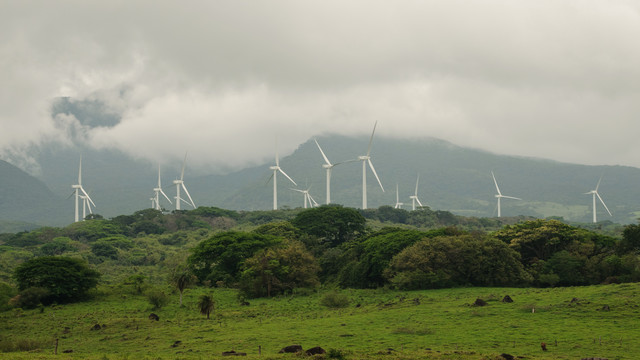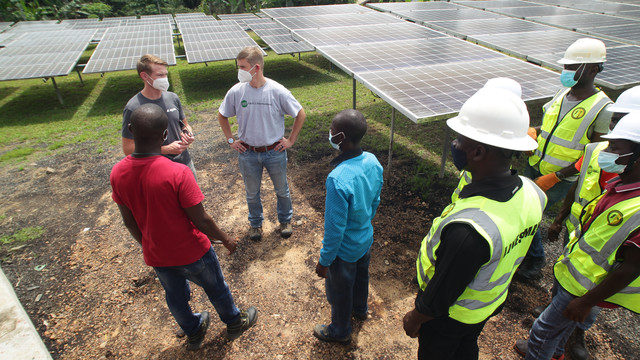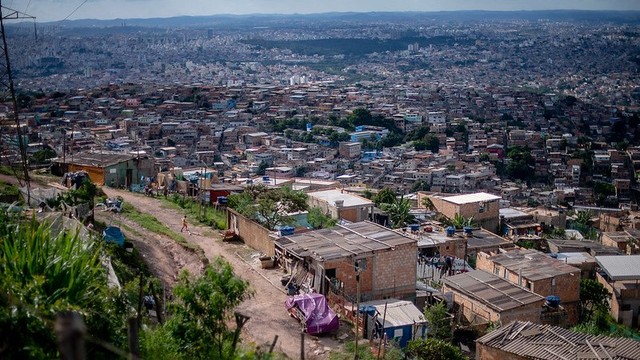2015: a critical year for the Least Developed Countries
As four major strands of global decision-making come together in 2015, IIED senior fellow Saleemul Huq explains why they are so important for the world's Least Developed Countries.


Saleemul Huq, left, discusses 2015's big issues with negotiators and ambassadors from the Least Developed Countries in New York in early April (Photo: Claire Hatfield/IIED)
Four major strands of global discourse come together in 2015, each with their respective negotiating tracks under the United Nations.
The relevance of all four tracks, their inter-linkages and synergies are especially significant for the poorest communities in the world and the poorest countries – which is why IIED recently hosted a retreat in New York to focus on the demands of the Least Developed Countries (LDCs) in the post-2015 agenda.
These four strands of the post-2015 process comprise:
- The 17 Sustainable Development Goals (SDGs) currently being negotiated and due to be agreed at the UN General Assembly in New York in September this year. These follow from the Millennium Development Goals (MDGs), which were meant to be achieved by 2015
- The United Nations Framework Convention on Climate Change (UNFCCC) which has a long history of negotiations to agree a climate treaty, and which is heading for a key decision at its 21st Conference of Parties (COP21) in Paris, France in December 2015
- The Financing for Development (FfD) track will also hold a major UN conference in Addis in July, where countries will seek to agree levels and ways of providing overseas development assistance (ODA) from the rich to the poor countries, and
- The fourth and final track is about disaster risk reduction under the Hyogo Framework for Action (HFA) which met in Sendai, Japan, last month, agreeing the new Sendai Framework for Action (SFA) (PDF).
All four of these parallel, but related, tracks and issues are particularly relevant for the group of 49 LDCs, which negotiate within the UN as a sub-group with the larger Group of 77 developing countries and China (G77). The mainly sub-Saharan African and Asian nations that make up the LDCs are among the poorest countries in the world, and among the most vulnerable to the adverse impacts of climate change.
The New York meeting, organised with UN OHRLSS, brought together key negotiators and UN ambassadors from this group, led by the LDC Group's head, the ambassador from Benin.
LDC delegations to the UN in New York are relatively small and so have very little time to devote to long-term issues like these, despite their importance. The retreat provided an opportunity to focus on the issues and go through the negotiating text for all the four tracks to develop coherent negotiating positions on behalf of the LDC Group.
Disaster risk reduction and the March meeting in Sendai
The disaster risk reduction discussion started more than a decade ago with the Hyogo Framework for Action. It agreed that all countries should be enabled to put in place national multi-stakeholder platforms to prepare disaster risk reduction plans and actions. The new Sendai Framework for Action reiterates the need to take action at both national and global levels.
Finance for Development
The FfD track dates back to 30 years ago when rich countries agreed to provide 0.7 per cent of their respective Gross National Income (GNI) to the poor countries as official aid.
Over the years, the amount given collectively by the rich countries each year amounts to around US$100 billion. However only a handful of countries have actually reached the promised 0.7 per cent pledge.
The negotiating text for the Addis Ababa conference in July is also in draft. The LDC Group is asking for aid to be prioritised for the LDCs.
Sustainable Development Goals
The SDGs are the successor to the eight MDGs, many of which, but not all, have been achieved. The new set of SDGs will be in place until 2030 and will be finally negotiated in September this year in New York at the UN General Assembly meeting.
The LDC Group has a special interest in the SDGs, not just because they are among the poorest and most vulnerable but because these new goals and targets could shape their development process.

Climate change and COP21 in Paris in December
The issue of human-induced global climate change is already the subject of a UN Treaty (the UNFCCC). This binds nearly 200 countries to act to tackle the global problem of climate change. The parties to the UNFCCC meet annually at the COP to review progress and update commitments.
Paris is particularly significant as parties will attempt to agree a revised treaty to keep global temperature rise below 2 degrees Centigrade by the end of this century, instead of more than 3 degrees where we are currently headed. It follows a failed attempt at COP15 in Copenhagen, Denmark in 2009.
LDCs have been identified under the convention as being the countries that are most vulnerable and so most deserving of support for adaptation to the changing climate. They have already been prioritised to receive funding from the Green Climate Fund (GCF), which was created to channel US$100 billion a year of funding from 2020 from rich countries to developing countries to tackle climate change.
The negotiating text for this agreement has been prepared ahead of a further round of negotiations in June in Bonn, to be finalised in Paris in December.
Conclusion
The four strands of the post-2015 processes are clearly of real significance to the LDCs. They stand to benefit most from strong agreements – and could lose out if the international community does not deliver.
With clear links between disaster risk reduction, Financing for Development, the SDGs and climate change, there are tremendous opportunities for synergistic solutions.
With just months remaining to secure these agreements, LDCs are working hard to ensure their voices and their needs are heard.
Saleemul Huq (saleemulhuq@iied.org) is a senior fellow at IIED and director of the International Centre for Climate Change and Development at the Independent University, Bangladesh.



